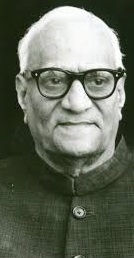10th August 1894
India’s fourth President V V Giri was born
What happened?
Aspirants can find information on the structure and other important details related to the IAS Exam, in the linked article.
| Aspirants should begin their preparation by solving UPSC Previous Year Question Papers now!!
To complement your preparation for the upcoming exam, check the following links:
|

On 10th August 1894, Varahagiri Venkata Giri, the fourth President of India and one of the patriarchs of the country’s trade union movement was born in Berhampur, Odisha.
V.V. Giri – Biography
- Born into a Telugu-speaking family, Giri’s parents were political activists in the independence movement.
- He studied law in Ireland and while there, he took part in Indian and Irish politics.
- While a student in Ireland, he and others produced a pamphlet that documented the ill-treatment of Indians in South Africa.
- His suspected association with the leaders of the Irish Uprising of 1916 caused him to be served a legal notice to leave Ireland.
- After returning to India, he started practising law in Madras.
- He joined the Indian National Congress. He also participated in Annie Besant’s Home Rule League.
- He gave up his successful legal career and plunged into the freedom movement during the non-cooperation movement led by M K Gandhi in 1922.
- In the same year, he was arrested for demonstrating against liquor shops.
- Giri was known for his role in the labour movement in India.
- He was one of the founding members and a General Secretary of the All India Railwaymen’s Federation in 1923.
- He became the President of the All India Trade Union Congress in 1926 for the first time.
- He also founded the Bengal Nagpur Railway Association. In 1928, he led a peaceful strike of the workers of the Bengal Nagpur Railway for the rights of retrenched workers. This was a landmark labour movement in India and the government had to concede to the workers’ demands in the end.
- Giri was also President of the Indian Trade Union Federation (ITUF), which he had co-founded with N M Joshi and others in 1929.
- Giri represented the workers in the Indian delegation that was sent to the International Labour Conference of the International Labour Organisation in 1927.
- He also represented workers in the Second Round Table Conference.
- Giri was a member of the Imperial Legislative Council from 1934 to 1937.
- He was also a member of the Madras Legislative Assembly.
- He was the Labour & Industry Minister in the C Rajagopalachari-led provincial Congress government during 1937-39.
- Giri took part in the Quit India agitation and was imprisoned for three years.
- After independence, V V Giri served in various capacities in the government. He was the High Commissioner to Ceylon, the Union Minister for Labour and the governor of Kerala, Uttar Pradesh and Karnataka.
- He was elected the Vice President of the country in 1967 till 1969 when he became the Acting President upon the death of the then President Zakir Hussain.
- He contested as an independent candidate in the presidential elections of 1969 which he won. Thus, he became India’s fourth president.
- He was the President of India from 1969 to 1974.
- After the end of his term, he was awarded the Bharat Ratna in 1975.
- Giri died in 1980 in Chennai aged 85.
Also on This Day ______________________________________________________________________________ 1581: Mughal Emperor Akbar won Kabul. 1930: Guntur Magistrate prohibited people in and around a 5-mile radius of Guntur from wearing Gandhi caps in the famous Gandhi Cap Case. 2000: Parliament approved bill which would lead to the creation of Uttaranchal.
See previous ‘This Day in History’ here.
Candidates can find the general pattern of the UPSC Exams by visiting the UPSC Syllabus page.
Related Links

Comments